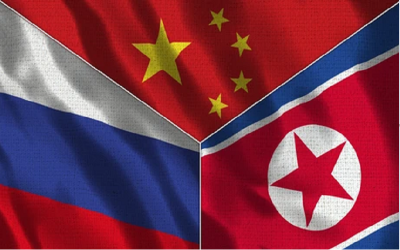The US Strategic “Containment” of China: Will it Encourage the Creation of a “Russia- China- North Korea Missile Alliance”?

All Global Research articles can be read in 27 languages by activating the “Translate Website” drop down menu on the top banner of our home page (Desktop version).
***
Russian Foreign Ministry spokeswoman Maria Zakharova warned last Friday that the US’ reportedly planned deployment of intermediate-range missiles to Japan “will certainly entail our retaliation”, which could realistically take the form of informally creating a Russian-Chinese-North Korean missile alliance in defensive response to that destabilizing scenario.
The US is so obsessed with attempting to “contain” China that it might ultimately be responsible for creating a Russian-Chinese-North Korean missile alliance if it doesn’t reconsider its reportedly planned deployment of intermediate-range missiles to Japan. Russian Foreign Ministry spokeswoman Maria Zakharova warned last Friday that such a move “will certainly entail our retaliation” because it “would have an extremely destabilizing effect from the standpoint of international and regional security.” The Neo-Realist theory of International Relations preaches that states will always put their security interests first, which in this case could realistically lead to Russia, China, and North Korea coordinating their defensive response to America’s emerging missile-driven threat as is their right under international law. Such an outcome would arguably be against the US’ regional security interests, including those of its Japanese and South Korean allies.
It must be remembered that the Russian-Chinese Strategic Partnership received an enormous boost in 2014 following the simultaneous onset of Western sanctions against the Eurasian Great Power during the Ukrainian Crisis in parallel with the US’ doubling down on its provocative actions in the South China Sea. The US’ strategic rivals as it officially considers them to be nowadays were pushed closer together than ever before due to their shared interests in responding to these provocations along their peripheries. Nevertheless, neither feels comfortable becoming the other’s military ally because they don’t want to get caught up fighting their partner’s possible wars in Eastern Europe and Southeast Asia respectively. That calculation might informally change as a result of the US’ reportedly planned intermediate-range missile deployment to Japan since such a move goes against both of their security interests in Northeast Asia, as well as that of their shared North Korean partner.
Russia and China already closely cooperate in the military sphere, with Moscow even helping Beijing construct a missile-attack warning system. This speaks to how much they trust one another. With that in mind, it’s only natural that they’d be pressed to take their military cooperation even further in the face of the US’ possible missile threats against them in Northeast Asia. North Korea might also coordinate with them in the event that it decides to double down on its missile program in response, thereby likely scuttling the already stalled denuclearization talks and possibly leading to another related crisis in the region. More multilateral pressure being put upon North Korea in that scenario would only push it closer to its Russian and Chinese neighbors, who both share Pyongyang’s concerns about the possible deployment of the US’ intermediate-range missiles in Japan. As such, an informal missile alliance between them wouldn’t be surprising.
The US doesn’t want Russia and China increasing their military cooperation even further than they already have, yet those two would have little choice but to do so as was argued, including through possible coordination with North Korea in the missile sphere. Some have previously speculated that such a scenario would be nightmarish for the US, but that’s exactly what the US is practically forcing them to do. In other words, from the American strategic standpoint, this outcome would be completely counterproductive for its interests. This observation raises the question of why responsible policymakers aren’t warning about that scenario considering how obvious it is. It can’t be known for sure, but it might very well be that the American strategic community has been captured by Sinophobic ideologues who are so blinded by their hatred of the People’s Republic that they don’t see how disadvantageous their so-called “missile diplomacy” with China is.
From the opposite perspective, those in favor of accelerating the onset of the Multipolar World Order will probably cheer the informal creation of a Russian-Chinese-North Korean missile alliance as a long-overdue development. They’ve been hoping that Russia and its partners would take such a step for a while already, yet it might ironically turn out that they needed American pressure to do so. It’ll remain to be seen what happens of course, but it seems unlikely that the US will hold back on its reported decision to deploy intermediate-range missiles to Japan or elsewhere in the region, thus catalyzing some form of the predicted response from Russia and its partners and thus potentially turning that scenario into a fait accompli. In any case, the world will find out soon enough what will ultimately happen, with the outcome interestingly being decided by none other than the US since its decision whether or not to provoke an Asian missile race will prove pivotal.
*
Note to readers: please click the share buttons above or below. Forward this article to your email lists. Crosspost on your blog site, internet forums. etc.
This article was originally published on OneWorld.
Andrew Korybko is an American Moscow-based political analyst specializing in the relationship between the US strategy in Afro-Eurasia, China’s One Belt One Road global vision of New Silk Road connectivity, and Hybrid Warfare. He is a frequent contributor to Global Research.
Featured image is from OneWorld

